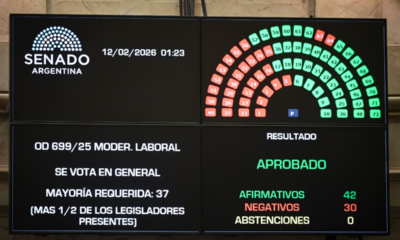INTERNACIONAL
California Dems run ads against GOP on sex trafficking bill after blocking penalties for teen solicitation

A series of Facebook ads funded by the California Democratic Party is claiming that Republicans are against stronger laws to protect 16- and 17-year-old sex trafficking victims amid a legislative fight over a minor solicitation bill in which Democrats successfully forced the exclusion of harsher penalties for the purchase or solicitation of older teens.
The ads began appearing on social media after a vote in the California Assembly last week when Democrat leaders refused to move forward with AB 379, which would have made it an automatic felony to purchase or solicit 16- and 17-year-olds for sex.
Featured in each ad is the name and image of a state Republican lawmaker who «voted against stronger laws protecting» older teens from sex trafficking, accusing them of protecting their «political party, not our kids.»
SON OF SUSPECTED WOULD-BE TRUMP ASSASSIN ARRESTED ON CHILD PORN CHARGES
California Assemblymember Maggy Krell, a Democrat, on Monday said she agreed to remove a provision in her child sex trafficking bill that ensures the crime of purchasing a minor for sex applies in all cases where the victim is under the age of 18. (Assemblymember Maggy Krell)
AB 379, authored by Democratic Assemblymember Maggy Krell, was an attempt to crack down on the buyers in the child sex trafficking trade and to align their punishments with the traffickers. The ad campaign came after the Democrat-controlled Assembly Public Safety Committee decided to move the bill forward as long as it didn’t carry the felony provision for those who solicit older teens for sex.
At the time, Krell told Fox News Digital that she was forced to exclude the felony provision in order for the legislation to move forward.
«I wholeheartedly disagree with that amendment,» she said. «This has been my life’s work and I will continue to partner with sex trafficking survivors and law enforcement to ensure all minors are protected from the horrors of sex trafficking.»
On Thursday, Democrats voted to strip the bill completely from Krell, a former prosecutor who investigated human trafficking, while excluding the automatic felony clause. They also inserted text that read, «It is the intent of the Legislature to adopt the strongest laws to protect 16-and 17-year old victims and strengthen protections in support of survivors of human trafficking.»
«Just when you thought the @CA_Dem couldn’t go any lower, any more pathetic and desperate, here they are, trying to falsely spin themselves out of siding with predators over children, (poorly) playing politics over people. SO excited for 2026,» the California Republican Party shared Monday on X.
WANDA BARZEE, ONE OF ELIZABETH SMART’S CAPTORS, ARRESTED ON ALLEGED SEX OFFENDER VIOLATION
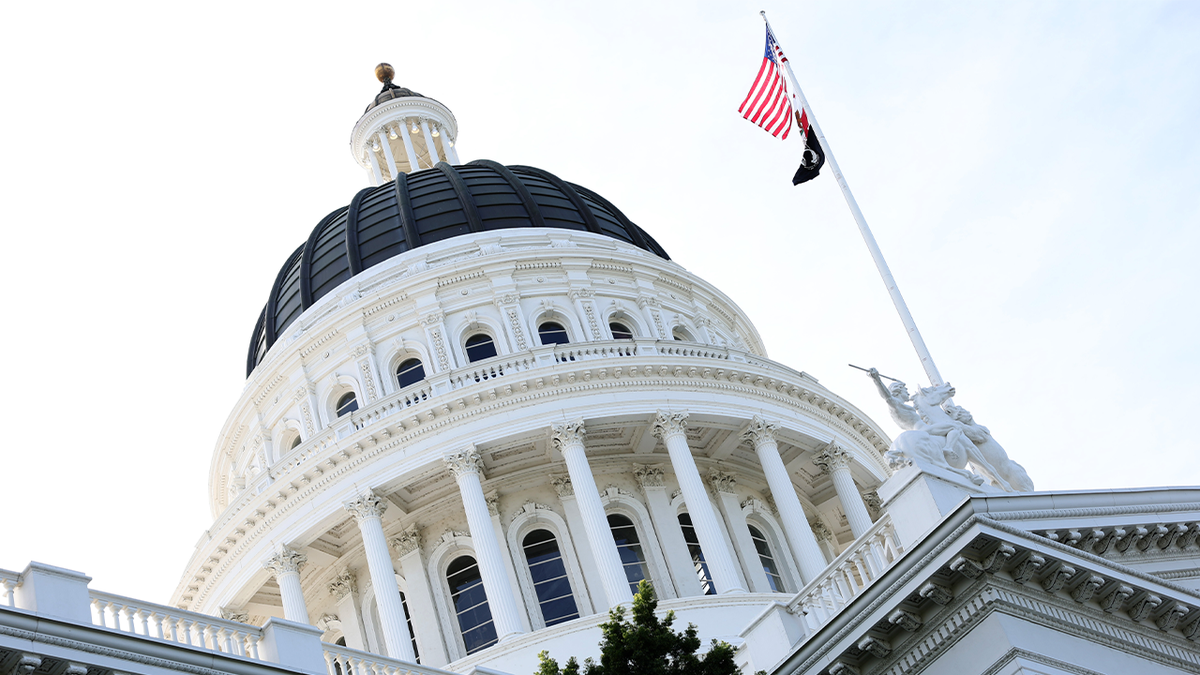
The California State Capitol (Arturo Holmes/Getty Images for National Urban League)
Several Republican lawmakers also pushed back against the accusation that their party doesn’t protect children.
«You see my friend Democrats lie… After we called @AsmDems out on the floor last week for removing protections for 16 and 17-year-old victims, they run ads accusing us… of the very thing they are doing,» Assembly Republican Leader James Gallagher wrote on X. «You can’t hide from the truth with deceptive ads. It is Democrats who can’t bring themselves to part with weird ideological politics to protect kids.»
Assemblyman Josh Hoover, one of several Republicans targeted in the ad campaign, said Democrats were attempting to gaslight Californians.
«Make no mistake, these ads are nothing but a distraction from their own failed record on public safety,» he wrote on social media. «I will continue to fight to restore the protections they removed, hold perpetrators accountable, and make sure all minors are treated equally under the law.»
The ad campaign was reportedly being pushed by the campaign of Assembly Speaker Robert Rivas. Fox News Digital has reached out to the California Democratic Party and Rivas’ campaign.
FATHER PRESSES FOR ANSWERS IN COLLEGE FRESHMAN DAUGHTER’S DEATH AFTER FALL FROM DORM: ‘SHE WAS OUR WORLD’
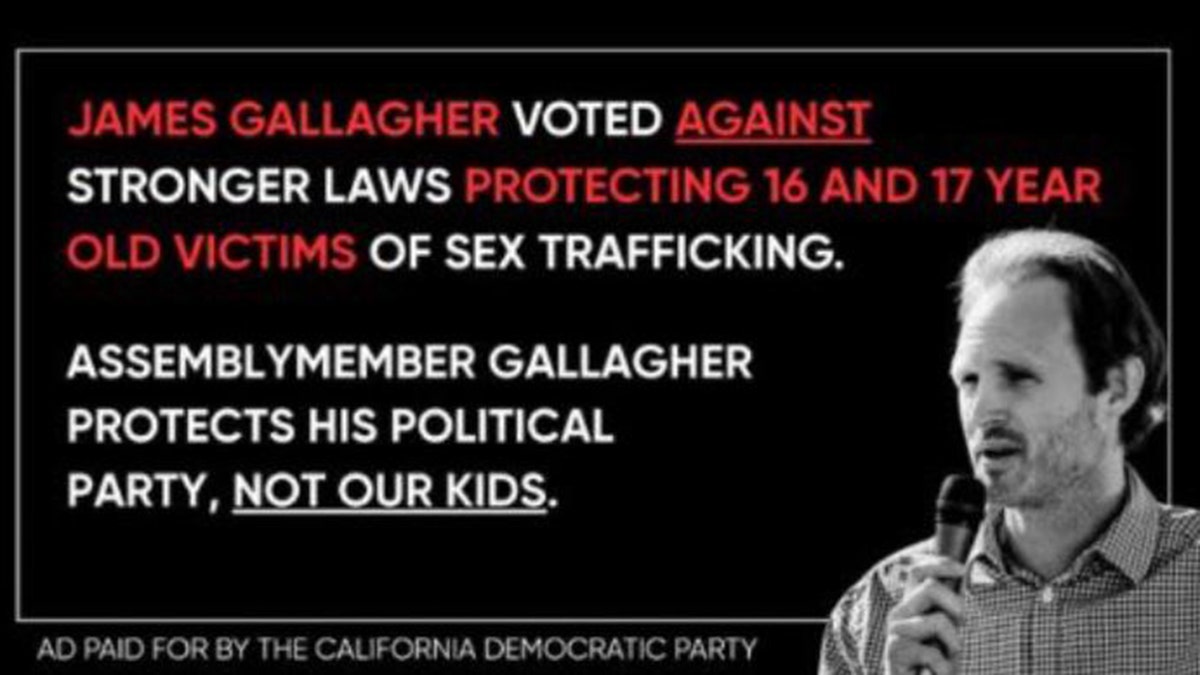
California Assembly Republican Leader James Gallagher and other GOP lawmakers were targeted by Democrats in a social media ad campaign. (Fcaebook)
AB 379 came together after older teens were left out of a state law that went into effect this year that makes it a felony to purchase a child aged 15 and younger for sex. Last year, California State Sen. Shannon Groven authored a bill that made it illegal to buy minors for sex, but it excluded 16- and 17-year-olds.
Currently, traffickers, not the buyers, face the harshest consequences when convicted of trafficking anyone under 18.
Last week, Democrat California Gov. Gavin Newsom said he supported harsher consequences for those who solicit minors for sex.
Assemblyman Joe Patterson said Newsom has lost control of his own party and that the state Democratic Party is treating him «like a lame duck.» Assemblywoman Kate Sanchez said Democrats across the state have failed Californians on a range of issues, including public safety, affordability and homelessness.
«All they have left are dirty lies that are easily rebutted by journalists,» she wrote.
The National Republican Congressional Committee also weighed in on the matter.
«California Democrats chose predators over children and out-of-touch Democrats Derek Tran and Dave Min have said nothing,» Christian Martinez, a spokesperson for the NRCC, told Fox News Digital while calling out Democrat lawmakers. «Worse, they’re letting their fellow Democrats whitewash their disgusting record of protecting the absolute worst among us.»
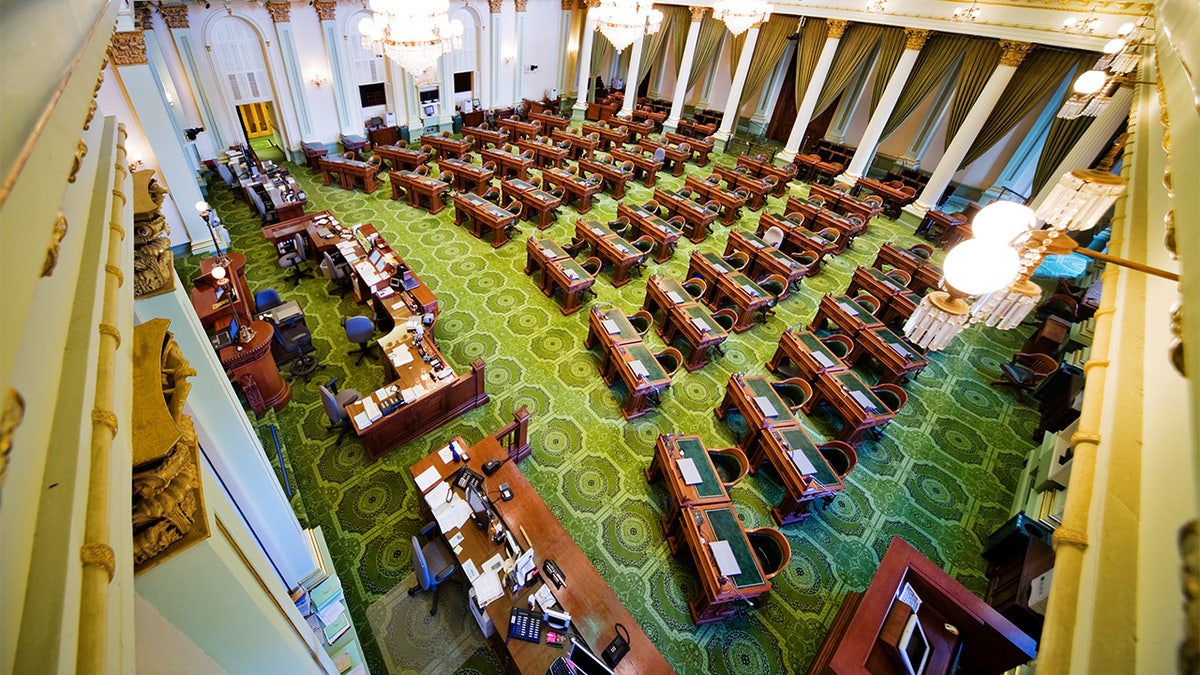
Inside the California State Capitol building (iStock)
CLICK HERE TO GET THE FOX NEWS APP
Last week, Krell said she didn’t care if the bill had her name on it or not, but would support any proposal that included protections for 16- and 17-year-olds.
California,US,Sex Crimes,Crime
INTERNACIONAL
Rafael Grossi propuso una reestructuración profunda de la ONU: “Necesita menos grasa y más músculo”

El candidato argentino a secretario general de las Naciones Unidas, Rafael Grossi, defendió una profunda reestructuración del organismo que requiere “menos gordura y más músculo”, y expresó que le resulta “muy doloroso” que Brasil haya decidido apoyar a otra candidata en lugar de respaldar su postulación.
“El proceso evolucionará y tal vez, en algún momento, yo tenga ese apoyo del Brasil”, dijo Grossi, actual director general del Organismo Internacional de Energía Atómica (OIEA), en una entrevista con el diario brasileño Folha de São Paulo al margen de la Conferencia de Seguridad de Múnich.
Brasil ha decidido apoyar la candidatura de la ex presidenta chilena Michelle Bachelet para liderar la ONU, alineándose con otros gobiernos de izquierda en la región, mientras que el presidente argentino Javier Milei respalda a Grossi. Esta división refleja las tensiones políticas en América Latina, aunque el diplomático argentino rechazó que su candidatura tenga un sesgo ideológico.
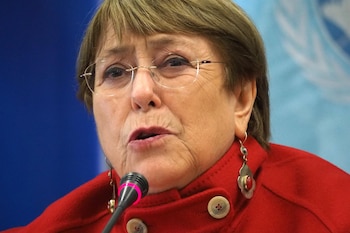
“Yo no soy un candidato de derecha, soy un funcionario internacional independiente”, afirmó Grossi. “O sea, la Argentina no está presentando su ministro de Relaciones Exteriores, un amigo del presidente Javier Milei. Tengo una trayectoria de 40 años en la diplomacia, gran parte de ella muy próxima de Brasil”.
El argentino, de 63 años, busca suceder al portugués António Guterres en uno de los momentos más desafiantes para la organización desde su creación en el posguerra. La ONU enfrenta cuestionamientos sobre su relevancia y atraviesa una crisis financiera sin precedentes, agravada por el recorte de fondos de Estados Unidos.
“Para mí, esta elección es una de las más decisivas en la historia”, señaló Grossi. “Hay una situación internacional marcada por un nivel altísimo de conflictos y fragmentación. Hay enormes dudas, escepticismo y pesimismo en cuanto a la capacidad de las Naciones Unidas de agregar valor. Dicen: ‘¿Para qué sirve? ¿Para qué existe?’ Algunos inclusive afirman que es una fuerza negativa”.
Ante este panorama, el candidato argentino propuso una reestructuración que va más allá de simples recortes presupuestarios. “Menos grasa y más músculo. Es decir, no una ONU raquítica, pequeña, débil, tímida y temerosa”, explicó. “La gente se da cuenta de que una ONU tan apagada tampoco es algo bueno”.
“Hay duplicidad de mandatos innegable. Hay un burocratismo innegable, hay seis, siete, ocho organismos hablando de las mismas cosas —eso también no es viable”, aseveró.
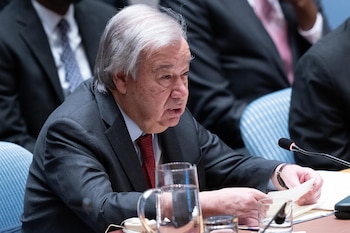
Grossi expresó confianza en su capacidad para reconectar a la ONU con las grandes potencias, particularmente Estados Unidos, que representa más del 22% del presupuesto del organismo. “Los EEUU fueron los que expresaron eso de forma muy clara, retirando recursos de la organización o suspendiendo sus pagos”, dijo. “Pero no veo otros que hayan dicho: ‘No se preocupen, yo pago.’ En la realidad, muchos otros comparten en silencio ese escepticismo”.
Consultado sobre si podría ser el candidato de Donald Trump, Grossi respondió con cautela: “Sería arrogante decir eso. Sería un error por mi parte. Lo espero, lo deseo, del mismo modo que quiero ser el candidato apoyado por todos esos países decisivos”.
Respecto a la reforma del Consejo de Seguridad, uno de los temas más sensibles en la agenda de la ONU, Grossi reconoció la legitimidad de países como Brasil para obtener un asiento permanente, aunque advirtió que el proceso depende de alcanzar “una configuración aceptable para otras regiones”.
El diplomático también abordó la ausencia histórica de mujeres en el cargo máximo de la ONU. “Creo en la igualdad entre el hombre y la mujer. A partir del momento en que hay candidaturas femeninas, el principio de la igualdad entre hombres y mujeres está perfectamente protegido”, afirmó, señalando que bajo su gestión en la OIEA la proporción de mujeres en altos cargos pasó de 28% en 2019 a 53% actualmente.
El argentino también defendió su equilibrio diplomático ante críticas de distintos bandos. “Cada vez que publico algo en el X, los rusos dicen: ‘Él está en las manos de los ucranianos.’ Y los ucranianos dicen: ‘Es un fantoche de Putin’”, ilustró.
El proceso de selección del nuevo secretario general requiere al menos 9 de 15 votos en el Consejo de Seguridad, donde Estados Unidos, China, Rusia, Francia y Reino Unido tienen poder de veto.
Hasta ahora, Grossi y Bachelet son los únicos candidatos formalmente nominados, aunque también suenan como posibles aspirantes la ex vicepresidenta de Costa Rica Rebeca Grynspan, la ecuatoriana María Fernanda Espinosa, la primera ministra de Barbados Mia Mottley, la exsecretaria ejecutiva de la CEPAL Alicia Bárcena y la ex primera ministra de Nueva Zelanda Jacinda Ardern.
Por una regla informal de rotación regional, le correspondería a un latinoamericano suceder a Guterres, cuyo mandato concluye en enero de 2027. La presentación formal de candidatos finaliza el 1 de abril.
Business,Domestic Politics,Corporate Events,South America / Central America,Government / Politics
INTERNACIONAL
Dem governor in deep-red state calls for ICE pullout, triggering clash over enforcement authority
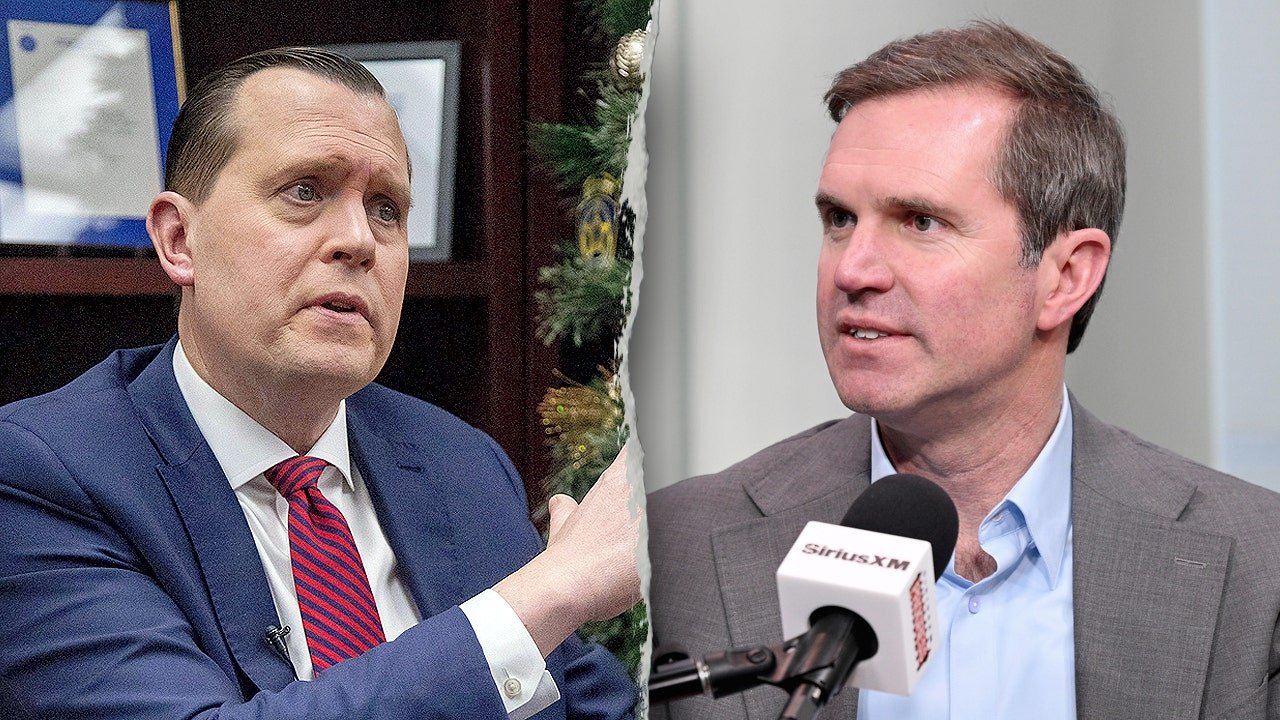
NEWYou can now listen to Fox News articles!
EXCLUSIVE: Kentucky Attorney General Russell Coleman fired back at Gov. Andy Beshear’s comments on «The View» about pulling ICE out of «every city,» setting up what could become a high-stakes intergovernmental battle over cooperation with federal immigration authorities.
«Every ICE agent should be withdrawn from every city and every community that they’re in. This organization has to be reformed from the top-down. Secretary Noem needs to be fired, and every agent needs to retrained,» Beshear told the ABC talk show, before adding the «body-count of American citizens» should lead to a «pause [to] pull everybody back.»
Coleman, who spoke to Fox News Digital from the sheriff’s office in Daviess County — home of NASCAR legend Darrell Waltrip and one of several Kentucky jurisdictions that work with ICE — said his take is «not a political one» and that ICE also has the backing of those lawmen he was meeting with after the interview.
«My view as the chief law enforcement officer of this commonwealth, someone that’s carried a badge and a gun, someone that has been a federal prosecutor, [is] that statement that the governor made was absurd,» Coleman said.
TOM HOMAN VOWS TO WORK AROUND NEW DEM VA GOV SPANBERGER’S EXECUTIVE ORDER ENDING ICE COOPERATION
Kentucky Attorney General Russell Coleman, left, and Gov. Andy Beshear (Marcus Dorsey/Getty Images; Gary Gershoff/Getty Images)
Coleman said the dispute centers on Beshear’s «commentary» versus the reality of which agencies he controls.
The Kentucky State Police fall under Beshear’s authority, but they currently work with ICE. Meanwhile, Coleman’s office works with the state’s 120 county sheriffs’ offices, many of which cooperate with the Department of Homeland Security.
«I don’t want to set up a straw-dog argument because the reality is the collaboration is never going to stop here because those of us who have taken an oath to protect families are going to work with our federal partners,» he said, pointing to recent successes across the Tug Fork River where such collaboration led to the arrests of 650 illegal immigrants in West Virginia.
FROM OBAMA AWARD TO MINNESOTA OP: WHY TRUMP TAPPED TOM HOMAN FOR ON-THE-GROUND CRACKDOWN
As for the legal ramifications of a potential clash between a DHS-aligned attorney general and a governor with opposing objectives, one legal expert said the situation presents an interesting case.
Former Florida federal prosecutor Zack Smith said that while every state’s attorney generalship is slightly different, a governor is an elected constitutional officer, just as sheriffs are, and that neither can tell the other what to do «in most instances.»
«The attorney general can issue opinions of law. He can issue certain advisory opinions about what state law means or requires. But there are very few instances, in Florida at least, where the attorney general can compel another constitutional officer, like sheriffs, to comply with state law.»
«Now, if they violate state law or something like that, obviously, he could then prosecute them, but there’s really not a lot he could do as a practical matter,» he said, adding that Beshear is likely relying on his gubernatorial «bully pulpit» to effect change.
«There are probably limits to what he can do — and keep in mind the 287(g) agreements» in the counties.
«I think this from a practical and policy perspective, this is a very foolish and very dangerous statement by the governor of Kentucky,» he said, pointing to Minnesota chaos bred from similar opposition to ICE operations.
PHILADELPHIA’S THREAT TO PROSECUTE ICE COULD TRIGGER LANDMARK COURT FIGHT OVER AUTHORITY, EXPERTS WARN
Beshear’s office did not respond to a request for comment.
Both Beshear and Coleman have served as attorney general — something the governor mentioned on «The View» — but Coleman said Beshear should therefore know that cooperation with federal authorities is preferable to going on offense.
«I’d like to, on one hand, be respectful of my predecessor… [but] anyone who’s spent time in law enforcement… knows that we are more effective at protecting people,» he said, noting that the county he was sitting in has ICE to thank for removing a violent child-sex predator from the streets and that local Owensboro authorities cooperated with a DHS operation to arrest an illegal immigrant who had been financially extorting seniors.
TRUMP DHS HAMMERS DEM GOVERNOR’S PORTAL TO TRACK ICE AGENTS: ‘ENCOURAGES VIOLENCE’
In neighboring Virginia, officials are moving to follow Beshear’s advice by ending state-federal cooperation forged under former Gov. Glenn Youngkin and advancing bills to restrict DHS collaboration.
When asked, Coleman said he does not see Frankfort following Richmond’s lead anytime soon and lamented the loss of several cooperative colleagues in Virginia.
«Fortunately, I don’t have to face that hypothetical here in this Commonwealth, but in our Mother Commonwealth (Virginia), it’s been very concerning. We [also] hated to lose a phenomenal colleague in Jason Miyares,» he added.
DHS also pushed back on Beshear’s position. Assistant Secretary Tricia McLaughlin said federal law enforcement «will continue arresting criminal illegal aliens across the state of Kentucky while sanctuary politicians like Governor Beshear continue to demonize our law enforcement and side with criminal illegal aliens over American citizens.»
CLICK HERE TO DOWNLOAD THE FOX NEWS APP
«We need state and local law enforcement engagement and information so we don’t have to have such a presence on the streets,» she said.
She listed several recent arrests in Kentucky, including Roman Sanchez, described as a criminal illegal immigrant convicted of homicide, willful killing of a family member with a gun, larceny, robbery, receiving stolen property and armed street robbery, as well as several individuals convicted of rape.
illegal immigrants,police and law enforcement,kristi noem,governors,kentucky,immigration
INTERNACIONAL
¿Qué hubiera dicho Henry Kissinger en la Conferencia de Seguridad de Munich?
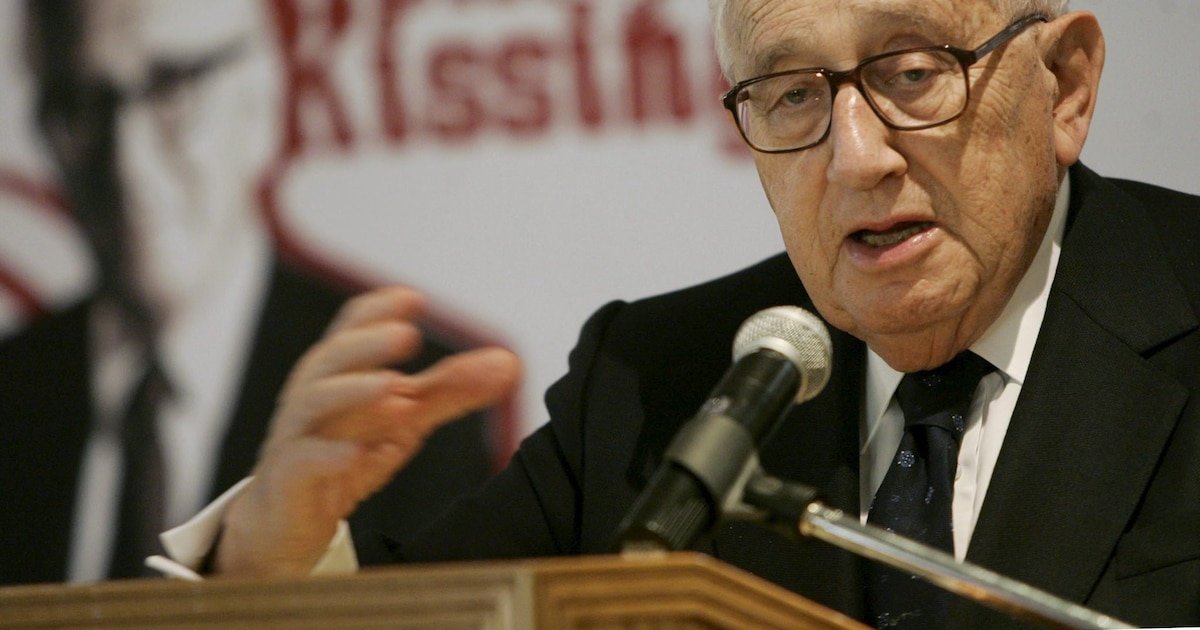
La Munich Security Conference (MSC) tiene lugar entre el 13 y el 15 de febrero de este año en el Hotel Bayerischer Hof, es la número 62, se consulta la participación de 200 representantes de 120 países, y sin duda, es la más importante para el tema geopolítico en Occidente, adquiriendo una renovada importancia por el protagonismo que ha adquirido, siendo quizás el elemento más llamativo de la época histórica que estamos viviendo, tanto que desde el punto noticioso, esta Conferencia es el equivalente de lo que representa Davos para el globalismo económico.
Marco Rubio llegó a Alemania con la misión de seguir manteniendo la presión sobre Europa para que invierta más en seguridad y defensa como también de seguir haciendo explícitas las diferencias que existen en temas como Ucrania, Rusia y el futuro de una alianza a la cual no se le aprecia hoy la misma utilidad que tuvo en el pasado, pareciendo decir que quizás debió haber desaparecido con la URSS, tal como ocurrió con el Pacto de Varsovia.
Aun en el peor escenario, la OTAN no desaparecería hoy por el costo impresionante que tendría concordar una política de defensa y seguridad con 28 diferentes países, tal como fue desarrollado en una carta abierta firmada por embajadores y ex encargados militares de esa institución, en el sentido que la inversión hecha beneficiaba a EE. UU., más que a los europeos, pero si las próximas elecciones la ganan los republicanos, sin duda quedaría reducida a una mínima expresión y sin cumplir un rol protagónico a nivel mundial.
En todo caso, como Rubio se ha limitado a repetir lo que ha dicho más de una vez, es de esperar que por la reacción que tuvieron en aquella oportunidad sus líderes políticos, es de esperar que al menos los servicios de inteligencia del Reino Unido y Francia no hubiesen sido sorprendidos tal como ocurriera el año pasado con la intervención del vicepresidente JD Vance con las muy duras críticas que hiciera a las políticas europeas sobre inmigración, partidos populistas y libertad de expresión, sobre todo en este último punto, donde los europeos, salvo excepciones como Hungría, se sintieron particularmente ofendidos, cuando aseguró que el continente sufría un “retroceso” al respecto, aunque a mi juicio, ello efectivamente ha ocurrido con esa libertad.
De hecho, a partir de ese momento, EE. UU. se transformó en quizás el único país en el mundo que ha transformado este tema en relevante para su política exterior, recordando la forma como el tema de los derechos humanos se incorpora hasta hoy en el gobierno de Jimmy Carter. EE. UU. lo ha incorporado en conjunto con la protección de sus gigantescas empresas tecnológicas, incluyendo X, Meta y Google, no solo con Europa sino también con Brasil y otros países, sirviendo de base, para sancionar a nivel internacional a funcionarios y jueces que han sancionado a ejecutivos de esas empresas, siempre en base a leyes estadounidenses, como ocurriera en el caso del Juez De Moraes y familiares, sanciones posteriormente levantadas.
En todo caso, en su estilo, Rubio parece menos interesado en la confrontación que Vance, su rival en la carrera por suceder en la presidencia a Trump. Rubio no va a asistir al foro después de su visita a Armenia y Azerbaiyán, uno de los siete lugares donde EE. UU. hoy ha mediado a favor de la paz y la mantención del cese de fuego, no perdiendo oportunidad de exigir mayor participación de Europa en aquellos conflictos como el que ha tenido lugar entre Armenia y Azerbaiyán, donde por ejemplo, Israel ha cambiado su apoyo a favor de los segundos, debido a que fue muy importante para la guerra de 12 días que sostuviera el año pasado con Irán, siendo clave para el despliegue del Mossad en Teherán, toda vez que los azeríes son una de las etnias perseguidas por los ayatolás, por lo que no deja de llamar la atención la espléndida bienvenida que le han dado a los israelíes, considerando que son un país musulmán a la vez aliado de Turquía.
Es tan solo uno de los sorprendentes cambios geopolíticos que han tenido lugar el último tiempo y que llevan a Marco Rubio a decir que vivimos en una nueva era en la geopolítica, y va a requerir que todos nosotros revisemos como se ve eso y cual va a ser nuestro papel, y, por lo visto EE. UU. piensa que la Unión Europea (UE) todavía no lo está haciendo.
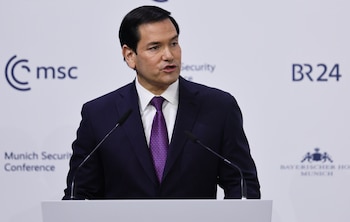
Además, todo esto está teniendo lugar después que el secretario general de la OTAN lograra un acuerdo en el tema de Groenlandia, ya que en definitiva, EE. UU. des escaló el lenguaje agresivo de adquisición de Groenlandia, aunque en definitiva lo más seguro es que no regrese, simplemente ya no es necesario, toda vez que obtuvo todo lo que quería, debido a que puede aumentar su presencia militar al mismo tiempo que toda la OTAN empezó a compartir el fondo de lo que planteaba Trump sobre la importancia del ártico, incluyendo la amenaza actual que representan China y Rusia, lo que antes era negado por los europeos.
En relación con cómo satisfacer a los europeos, Rubio aceptó que le parecía razonable que sus aliados “quisieran saber hacia dónde vamos, hacia dónde nos gustaría ir, hacia dónde nos gustaría ir con ellos”. Sin duda, esta Conferencia tiene lugar en Munich en un momento importante en lo que a definiciones se refiere, toda vez que además se desarrolla poco antes que Trump convoque el 19 de febrero en Washington la primera sesión de su Consejo de Paz, inmediatamente después de una reunión que tuviera con Benjamín Netanyahu para resolver las diferencias que existen sobre Irán. En este Consejo, la OTAN no ha sido relevante como tampoco Europa, pero también podría dar origen a una nueva institucionalidad geopolítica, si es verdad que podría reemplazar a la ONU para asegurar la paz a través del mundo.
Si fuera real esto último, sería en cumplimiento del rol secundario que la Estrategia de Seguridad Nacional 2025 le atribuye tanto a Europa como a la OTAN desde el punto de vista geopolítico. Rubio envía al respecto otro mensaje, ya que viajará acompañado por Sarah Rogers, subsecretaria de Estado para diplomacia pública y muy crítica de las políticas de la UE, incluyendo su irrelevancia actual.
El último mensaje es que después de su participación, Rubio continuará su gira por Eslovaquia y Hungría, donde gobiernan líderes nacionalistas, cercanos a Putin y a Trump, al mismo tiempo de ser muy críticos de la UE.
La novedad es el traslado a Munich de la polarización y división que caracteriza a EE. UU., ya que los demócratas se hicieron presentes con el discurso que Europa debiera confrontar y resistir a Trump, ya que de ganar ellos las presidenciales del 2028, EE. UU. cambiaría dejando sin efecto todo lo hecho por su gobierno. La “presencia demócrata” tuvo lugar con dos presidenciables como lo son el gobernador Newsom de California y la representante Ocasio-Cortés quienes acudieron con un mensaje alternativo y de crítica a Trump, al mismo tiempo de mostrar sus diferencias internas. Al parecer por el momento no hay consenso, además de mostrar que ninguno de los dos tiene claridad en temas internacionales. Es, en todo caso, un cambio que fue bien recibido por algunos europeos, ya que el gran defecto de la oposición demócrata es que precisamente en años no ha demostrado ser alternativa, más allá de rechazar lo que Trump dice y hace, aquí se vio por lo menos los inicios de un proceso que debiera conducir a un nombre que represente como líder a ese partido, posición que hoy está vacante.
Mientras tanto hay novedades por todas partes, sobre las cuales EE. UU. debiera tener una posición, debido a que sigue siendo la principal potencia del mundo, a modo de ejemplo que Suiza busca hacer un referéndum para limitar su población a 10 millones de habitantes, lo que es novedoso como tema de autolimitarse en el crecimiento, como forma de regular un problema inmigratorio donde realmente Europa no parece saber qué hacer.
Esta falta de claridad en torno a qué hacer, hace resurgir el nombre de Henry Kissinger, y en lugares como esta Conferencia de Munich, más de alguien debe haberse preguntado como lo estoy haciendo yo, qué haría alguien como el más importante diplomático estadounidense de la segunda mitad del siglo XX, es decir, cuál sería la propuesta o el análisis de Henry Kissinger para abordar el tema de Ucrania-Rusia o el de China, toda vez que Marco Rubio acudió reconociendo lo obvio, que no sabe si Rusia quiere poner fin a la guerra en Ucrania, aunque sí dijo algo que no es obvio para todos, en el sentido que Washington quería “vigorizar” la relación trasatlántica.
La verdad es que no es difícil responder, a pesar de que murió después de cumplir un siglo el 29 de noviembre de 2023, y en vida escribió mucho sobre la ex URSS y China como también libros acerca de liderazgo, manteniéndose activo intelectualmente hasta el final de sus días, opinando incluso sobre Inteligencia Artificial, o sobre cómo responder a la reocupación de Crimea por parte de Rusia, de la invasión a Ucrania y cómo evitar la tercera guerra mundial. Probablemente alguien como Kissinger también tendría una opinión detallada en relación con los 20 puntos del último plan de Estados Unidos para la paz, al igual que como estudioso de la historia tendría una aproximación personal a la doctrina de las “regiones históricas” de Rusia, el mapa de Putin para redibujar Eurasia, ya que ese era un origen lejano a un conflicto quizás inevitable, si Putin consideraba a las regiones vecinas como “creaciones artificiales”, con la potencialidad para una confrontación de largo plazo con Occidente, si se deseaba que el conflicto con Ucrania fuera a prolongarse en el tiempo.
Kissinger estaba convencido que EE. UU. y China debían aprender a convivir, para lo cual tendrían menos de 10 años, por lo que estaría satisfecho que la Estrategia de Seguridad Nacional 2025 redujera a una confrontación principalmente económica lo que ahora están teniendo lugar, junto a un proceso de negociación en marcha. En relación a que si se podía negociar con Putin, más de una vez destacó que Israel lo hizo en Siria, lo que se logró a plena satisfacción de ambos, a pesar de que estuvieron siempre apoyando a rivales, debido a que Rusia lo hizo con Bashar al-Asad.
La verdad es que todo indica que Kissinger seguía siendo la expresión más lúcida de la llamada escuela realista que tanto orientó su quehacer académico como también las decisiones que tomó como autoridad de gobierno. Su reflexión parecía siempre tener como punto de partida, que incluso Rusia y China necesitaban de una buena diplomacia, y que, en comparación a China, Ucrania sería un conflicto menor, contenido geográficamente, por lo que China sería el único con la capacidad como para conducir a una tercera guerra mundial.
Tenía una comprensión del conflicto ucraniano que lo haría un interlocutor grato para Putin, ya que después del 2014 aconsejó que no hubiera una respuesta dura a Rusia por la toma de Crimea, y que se mantuviera abierto el diálogo, considerando su importancia decisiva para los rusos, además que históricamente fue parte del Imperio ruso, siendo fundamental para su marina, y que solo fue transferido a Ucrania como parte de un acuerdo administrativo tomado en 1954 e impulsado por un ucraniano como lo era Nikita Jrushov.
Al mismo tiempo, siempre parecía entender que la guerra, realmente la invasión de Ucrania no se inició el 24 de febrero de 2022, sino el 2014 con la ocupación de buena parte del Donbás y la mencionada de Crimea. En general, creo que la respuesta a la pregunta de si había una solución para lograr la paz en Ucrania, no sería muy diferente al camino que hoy ha tomado EE. UU. para llegar a un cese del fuego, pero ante la reiterada negativa de Rusia a avanzar por este camino, creo que al igual que en la estrategia de detente seguida con la URSS, se abriría a utilizar lo único que podría interesar a la actual Rusia y a un liderazgo personal como el de Putin, que sería aceptar su posición que para resolver el conflicto se necesitaría revisar el fin de la URSS, y abrir una negociación para fijar las fronteras definitivas, lo que Putin dice que no debiera ser la división administrativa de la URSS en 15 repúblicas, sino un acuerdo político entre EE. UU. y la actual Rusia como sucesora legal.
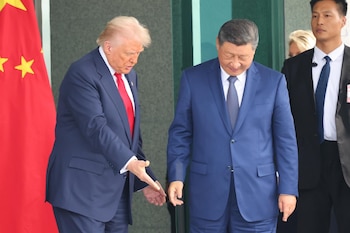
Por cierto, ello es difícil de aceptar para EE. UU., ya que requeriría una negociación tan extensa como lo fue la Detente del siglo pasado, y no el apuro que tiene un gobierno como el de Trump al que se le acortan los plazos para la elección en noviembre de medio término, ya que de partida requiere hacer al revés el viaje que Nixon y Kissinger hicieran en 1972. Para ello, sin duda, no tiene en Trump el apoyo que tuvo con Nixon.
Por ello, se necesita algo que no hay evidencia que hoy esté disponible, que se abriera un escenario distinto, donde se le ofrezca a Rusia algo semejante a lo que se le ofreció a China en esa oportunidad, un incentivo tal que lleve a Rusia a renunciar a la alianza que hoy tiene por primera vez en la historia con China, lo que no existió ni siquiera durante el comunismo.
No hay evidencia alguna que EE. UU. desee ir por este camino, donde hay más obscuridad que claridad, pero mi opinión sería que, aunque no lo apoyara, entendería mejor que muchos porque Trump está siguiendo un camino donde hasta el minuto, a pesar de todas las concesiones hechas, no ha logrado tener éxito en convencer a Putin. Es parte de una relación que con Trump sería muy distinta a la que tuvo con Nixon, ya que le sería difícil adaptarse a sus frecuentes cambios de opinión, a veces, incluso en el mismo día.
En relación con China, creo que Kissinger entendería que los dirigentes chinos y Xi Jinping en particular, se sienten insultados por un trato que ellos consideran condescendiente por parte de EE. UU., ya que el poder económico que poseen los hace un rival distinto, más poderoso del que fuera la URSS, salvo en lo militar. En ese sentido, a diferencia de la negociación actual, Kissinger revisaría en detalle lo que el propio EE. UU. hizo para desbancar el siglo pasado a la Gran Bretaña de su sitial como superpotencia, ya que hoy China está haciendo lo mismo, paso a paso, para intentar hacerlo con EE. UU.
Mi opinión es que así como en sus memorias relata que ante su curiosidad de qué opinaba Zhou Enlai sobre la Revolución Francesa, destacaba como brillante la respuesta que era muy pronto para tener una opinión, por lo que hoy seguramente recurriría a lo que opinaba el general De Gaulle cuando decía que en la Segunda Guerra Mundial, Japón y Alemania perdieron la guerra mientras que el Reino Unido y Francia fueron países derrotados toda vez que iniciaron la guerra como grandes países coloniales, y al término de ella eran potencias de segundo orden. Aplicado al actual conflicto europeo, diría lo mismo que señalaba un especialista en geopolítica en estas páginas: que Ucrania estaba perdiendo la guerra, pero Rusia estaba siendo derrotada, si se considera el desempeño militar que se esperaba de ella el día de la invasión. Es en ese sentido que Kissinger seguramente aconsejaría la lectura del libro de Graham, la Trampa de Tucídides, para entender el momento en que estarían China y EE. UU. para entender por qué en relación con Taiwán en ningún caso aconsejaría que se siguiera el camino tomado por la administración Biden en relación con la invasión de Ucrania, ya que ese camino destruiría la isla y devastaría la economía mundial.

Es decir, lo que haría Kissinger es rebajar la temperatura nunca subir los decibeles, en otras palabras, lo que ha intentado hacer Trump, quizás con mayor éxito con China que en el escenario ucraniano. Por lo mismo, quizás su consejo final sería intentar hacer lo mismo que para efectos del cese de fuego ha tenido éxito en el medio oriente, es decir, “definir objetivos que puedan sumar gente. Encontrar medios, medios descriptibles de alcanzar esos objetivos”, agregando lo que permitió la detente con la URSS en el contexto de la guerra fría, es decir, evitar lo que fracasó con Biden y que hasta el momento también fracasó con la invasión rusa, en el sentido de que “la actitud de todo o nada es una amenaza para buscar la distensión”.
Y eso incluye la opinión final que expresó en vida sobre el líder ruso, en el sentido que “al final, Putin cometió un error de juicio catastrófico”. En definitiva, creo que Kissinger hubiera apoyado regresar a lo que se acordó como solución en Los Acuerdos de Minsk (2014-2015), es decir, acuerdos internacionales que fueron firmados por Ucrania, Rusia, Francia y Alemania, el llamado Cuarteto de Normandía para detener la primera guerra del Donbás que establecían un alto al fuego, la retirada de armamento pesado y una hoja de ruta política, que establecía la federalización del territorio, el respeto a los derechos de la minoría rusa y la autonomía regional, y que también fue firmado por los separatistas rusos. En definitiva, fue lo que pudo haber evitado la guerra, y a pesar de no haber sido respetados ni por los rusos ni por Ucrania, todo se pudrió con la invasión.
El consejo de Kissinger hubiese sido regresar a lo único que pudo haber evitado la invasión. Hoy sería también, según creo, que Kissinger agregaría que sería la forma de obtener un triunfo europeo, al lograr una frontera estable. El contexto sería lo que le dijo a The Economist: “Creo que todos tenemos que admitir que todos estamos en un mundo nuevo (donde) no hay un rumbo garantizado y (donde) Estados Unidos necesita desesperadamente un pensamiento estratégico a largo plazo”. Algo que todavía carece, agrego yo como también recuperar el consenso perdido, que tanto desmerece su rol de gran potencia.
@israelzipper
-Máster y PhD. en Ciencia Política (U. de Essex), Licenciado en Derecho (U. de Barcelona), Abogado (U. de Chile), excandidato presidencial (Chile, 2013)
kissinger

 POLITICA3 días ago
POLITICA3 días agoA quién afecta la Reforma laboral: estos son los puntos clave del proyecto de Milei

 POLITICA3 días ago
POLITICA3 días agoReforma laboral: la modificación sobre accidentes o enfermedades ajenas al trabajo

 DEPORTE3 días ago
DEPORTE3 días agoEl Barça y media Europa esperan: la joya de 19 años Diomandé atrapada en un lío legal























